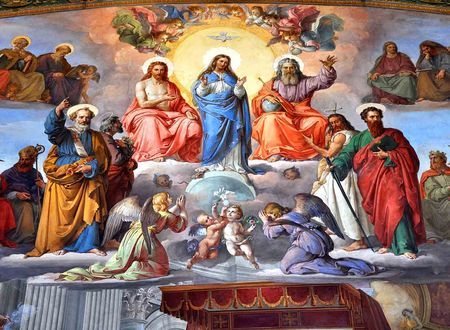Bringing you one of the most profound teachings of Christ – Sermon on the Mount (Mathew 5)
The Beatitudes
Beatitude signifies supreme blessedness, the bliss of heaven. Jesus here sets forth some moral and spiritual principles, which when followed, fills one’s life with heavenly bliss.
3. Blessed are the poor in spirit: for theirs is the kingdom of heaven
Here “poor in spirit” indicates inner renunciation, that is giving up one’s desire to material objects, earthly possessions, materially minded friends and selfish human love. Only through purification of inner renunciation, the soul rediscovers its riches in the Eternal Kingdom of Wisdom and Bliss.
4 Blessed are those who mourn, for they shall be comforted.
Jesus is not talking about the pangs of sorrow the ordinary man experiences on account of the non fulfillment of earthly desires or loss of human love. He is talking of the deep yearning for the Eternal Beloved, that arises in the soul, when the consciousness begins to awaken. Those who cry for God with single minded yearning, and refuse to be appeased by anything lesser, will forever find comfort in the arms of Blissful Divinity.
5 Blessed are the meek, for they shall inherit the earth.
It is not the proud, but the humble and meek person who will be open to recieve wisdom and happiness.
6 Blessed are those who hunger and thirst for righteousness, for they shall be satisfied.
“Hunger” and “thirst” are metaphors for man’s spiritual quest. Hunger is the inner emptiness, which is the soul’s desire for God. Only the one who is thirsty for knowlege regarding how to attain salvation, and who practises righteousness in life, can appease his hunger for God realisation and experience unparalleled satisfaction of heart and soul.
7 Blessed are the merciful, for they shall receive mercy.
The mercy Jesus is talking about is the sort of fatherly heartache the Divine has for its erring child. It is the mercy Jesus expressed when instead of judging and destroying the enemies who would crucify him, he asked Father to forgive them, “for they know not what they do.” When one sees humanity as a loving father looks after his children, and is ready to suffer for them, then one becomes Christ like. And by mercy, one offers not forgiveness alone, but also extends actual spiritual help in eliminating the error in an individual. To recieve divine mercy, one must be merciful to oneself, making oneself spiritually qualified, and also be merciful to other deluded children of God.
8 Blessed are the pure in heart, for they shall see God.
All scriptures agree in this: self purification is the prerequisite to God realisation. The Bhagavad Gita speaks of the blessedness and divine perception of one who has attained inner purification: “The Yogi who has completely calmed the mind, and controlled the passions, and freed them of all impurities, becomes one with Me. He who perceives Me everywhere and beholds everything in Me never loses sight of Me nor do I ever lose sight of him.”
9 Blessed are the peacemakers, for they shall be called sons of God.
They are real peacemakers, who generate peace from their devotional practice of daily meditation. Peace is the first manifestation of God’s response to meditation. Those who commune with this Peace God in the inner temple of silence are His true children. And having realised the nature of God as inner peace, these devotees strive to manifest this peace in their home, in the neighborhood, in the nation, and among nationalities and nations, thereby becoming peacemakers.
10 Blessed are those who are persecuted for righteousness’ sake, for theirs is the kingdom of heaven.
Those who persist in doing what is right, despite being criticised wrongly by others, and those who are uninfluenced by the wrong customs or society’s harmful habits are the ones who will experience the bliss of God. Here, Jesus also offers encouragement to those who are tortured by sensory temptations and bad habits, that if they persist in practicing self control, they will in due course of time, overcome these temptations and win the kingdom of eternal joy.
11 Blessed are you when others revile you and persecute you and utter all kinds of evil against you falsely on my account. 12 Rejoice and be glad, for your reward is great in heaven, for so they persecuted the prophets who were before you.
Here, Jesus is encouraging his disciples to walk the spiritual path, telling them that the materially – minded persons will always criticise them, and create problems for them. But if they persist in the path, bearing all the critiscism cheerfully, the rewards are immense. In Bhagavad Gita, the Lord says, “He who is tranquil before friend and foe alike, and in encountering adoration and insult, and during experiences of pleasure and suffering, who has relinquished attachment, regarding blame and praise in the same light; who is quiet and easily contented, and of calm disposition and devotional – that person is dear to me.”
To be hated, ostracized, reproached or cast out is in itself not a cause for being blessed. But when despite such prosecution, the devotee clings to truth as manifested in the teachings of a Christ-like Guru, then he will be free in ever lasting blessedness.
These Godly traits extolled by Jesus, have been demonstrated in the lives of all the great ones who have come to earth, to show humanity the way to everlasting blessedness or blissful consiousness.
The explanations have been based on my reading Sri Sri Paramhansa Yogananda’s book “The Second Coming of Christ”
Please forgive me for any mistakes, and please feel free to correct me… This is a humble attempt to bring to you these profound teachings, with my limited understanding.







Comments & Discussion
16 COMMENTS
Please login to read members' comments and participate in the discussion.